June 18, 2025 | 01:21 GMT +7
June 18, 2025 | 01:21 GMT +7
Hotline: 0913.378.918
June 18, 2025 | 01:21 GMT +7
Hotline: 0913.378.918
Hau Giang province is currently managing over 3,800 hectares of forests, which account for 2.36% of the province's natural area. This area is relatively smaller compared to that of other provinces and cities in the Mekong Delta region. However, the majority of Hau Giang's forest area is concentrated in the Lung Ngoc Hoang Nature Reserve with a natural area of 2,805 hectares, including 1,434 hectares of forest. Hau Giang's forest area plays an indispensable role in protecting the ecosystem in the Mekong Delta.
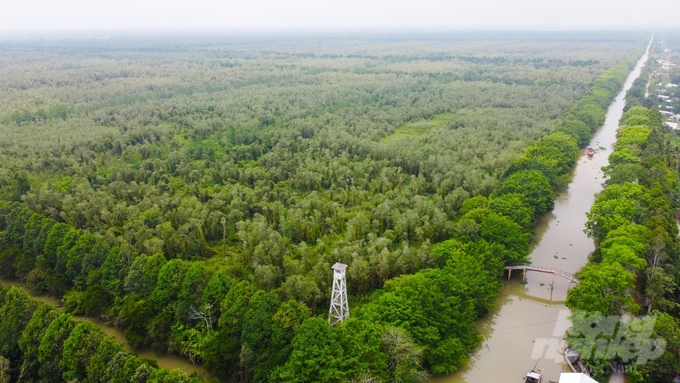
Lung Ngoc Hoang Nature Reserve is dubbed the "green lung" of the Mekong Delta. Photo: Van Vu.
Consequently, forest management, protection, and fire prevention and control activities have remained as priority tasks for the provincial leadership and local authorities of regions with forest areas.
Hau Giang province currently houses two major forest owners: the Lung Ngoc Hoang Nature Reserve and Hau Giang Spring Agricultural Joint Stock Company. They boast a comprehensive system of canals, ditches, dikes, and boundaries, facilitating forest management and protection activities.
Additionally, as a low-lying area with stable freshwater reserves and minimal saltwater intrusion, the province has been relatively effective in its annual forest fire prevention and control efforts. Furthermore, Hau Giang has recently approved the exploitation of honeybee nests. Accordingly, forest owners and local households established contracts to implement the co-management policy. This approach has discouraged local residents from sneaking into the forest to smoke out bees, which poses a fire risk.
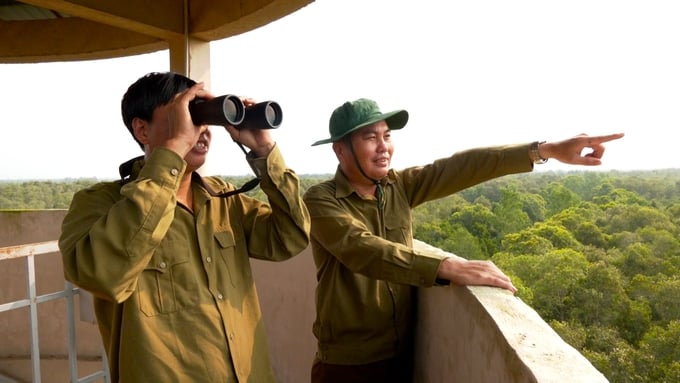
The Management Board of Lung Ngoc Hoang Nature Reserve assigns forest fire response forces according to a fixed schedule in compliance with regulations. Photo: Van Vu.
Ngo Minh Long, General Director of Hau Giang province's Department of Agriculture and Rural Development, highlighted another advantage contributing to the effectiveness of forest fire prevention efforts in the province during the dry season: the adoption of information technology. Notable achievements include the use of 42 cameras to monitor forest fires and unauthorized access to forests. Additionally, 28 forest fire danger signs have been installed; and canals and ditches have been cleared to store water during the dry season. Water storage dams have been reinforced, and patrol roads for forest protection have been repaired. These effective measures have helped protect the forests in Hau Giang and effectively control unauthorized access.
Director Lu Xuan Hoi, regularly stationed at the Lung Ngoc Hoang Nature Reserve, is confident in the strategy of organizing fire prevention awareness campaigns for local residents and students in critical fire-prone areas within the reserve's jurisdiction.
Notably, the Department of Agriculture and Rural Development's initiative to assign forest protection officers to communes with forest areas has reinforced local forest management, protection, and fire prevention efforts across all administrative levels within the province.
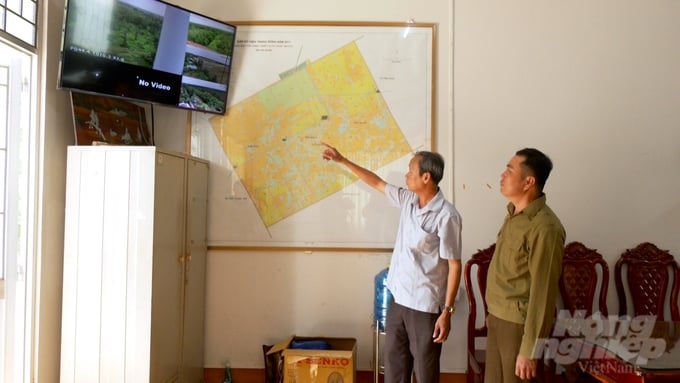
The installation of forest fire monitoring cameras, which also track unauthorized access, is an effective solution for forest fire prevention. Photo: Kim Anh.
At present, 7 provincial forest protection officers are responsible for monitoring 15 communes with forest areas. As a result, Hau Giang has not experienced incidents involving forest land encroachment or forest fires for multiple consecutive years.
Additionally, the province's Sub-Department of Forest Protection regularly provides updates on weather conditions; measures the moisture content of combustible materials in the forest; and utilizes fire alerts from the National Department of Forest Protection to analyze and determine fire forecasts tailored to the local conditions.
Despite the recent rainfall in multiple forested areas across Hau Giang province, which has eased the pressure on forest fire prevention efforts, the persisting heatwaves in the Mekong Delta region, coupled with low humidity and infrequent rainfall, pose a significant risk of forest fires. Consequently, General Director Ngo Minh Long has requested the forest protection sector, in coordination with local authorities and forest owners, to maintain vigilance and proactive measures outlined in the fire protection plan.
Namely, stakeholders must focus on monitoring and inspecting forest fire response capacity across all administrative levels in order to ensure timely and effective communication.
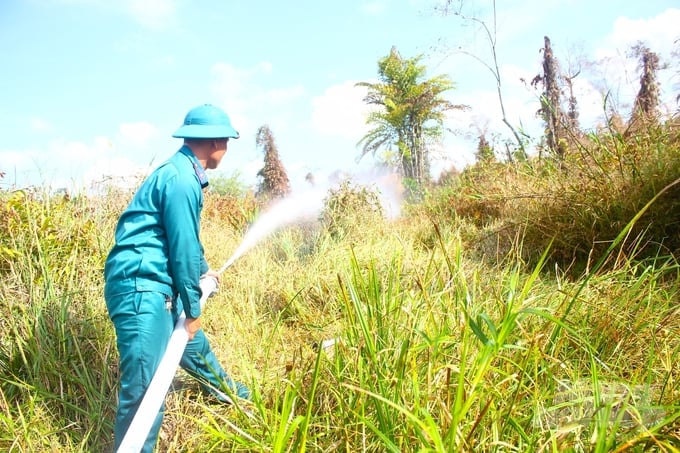
With the proactive implementation of coordinated strategies, Hau Giang province has not reported any forest fires to date. Photo: Van Vu.
Additionally, the province's forest protection sector must coordinate with forest owners in implementing fire prevention measures, organizing fire drills, and assessing the response time for mobilizing firefighting resources and personnel under the "four on-site" principle.
Notably, the province's Sub-Department of Forest Protection must effectively forecast and issue alerts regarding forest fire risks, thereby providing timely information to local authorities and forest owners.
According to the Ministry of Agriculture and Rural Development, Vietnam recorded 89 forest fires within the first four months of 2024, affecting approximately 498 hectares of forests. Affected areas include planted forests, natural forests, and regenerating young forests, marking an increase of over 25% compared to the corresponding period in 2023.
These forest fires have presented a significant challenge in forest management and protection efforts; caused extensive economic losses; and damaged the ecological environment. Several notable forest fires have also resulted in human casualties.
Translated by Nguyen Hai Long
![Turning wind and rain into action: [7] Early disaster warnings help marine farmers minimize losses](https://t.ex-cdn.com/nongnghiepmoitruong.vn/608w/files/news/2025/06/17/z6704423696987_15fd32ffc26d590d204d520c9dac6786-nongnghiep-142942.jpg)
(VAN) In recent years, thanks to early disaster warnings and forecasting, marine farmers in Khanh Hoa province have been able to reduce risks and losses, thereby improving production efficiency.
![Turning wind and rain into action: [6] ‘Four on-the-spot’ disaster management software](https://t.ex-cdn.com/nongnghiepmoitruong.vn/608w/files/news/2025/06/17/e5a48259d6a262fc3bb3-nongnghiep-183800.jpg)
(VAN) By simply activating the scenario on the disaster management software, the relevant authorities immediately know how many households need to be evacuated, where to evacuate them to, and by what means of transportation…
![Turning wind and rain into action: [5] Hue applies modern technology in disaster forecasting](https://t.ex-cdn.com/nongnghiepmoitruong.vn/608w/files/news/2025/06/17/z6704423696987_15fd32ffc26d590d204d520c9dac6786-nongnghiep-093938.jpg)
(VAN) In Hue city, modern technology has recently been applied in meteorological and hydrological forecasting and warning, helping to reduce the damage caused by natural disasters.

(VAN) A cutting-edge farming technique being implemented on an experimental ranch in Arizona's Sonoran Desert has already saved a billion gallons of water over five years, according to Civil Eats.

(VAN) Poultry and pig production and the environment can be boosted through enhanced water technology, according to new research.
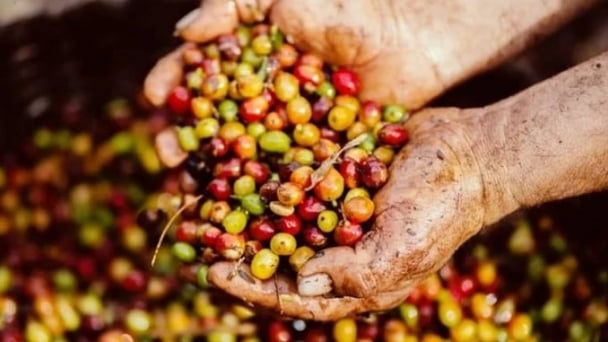
(VAN) Coffee prices on June 16, 2025 are unchanged. In Vietnam, local trading prices are holding steady, ranging around VND 112,000 – VND 112,500/kg.
![Turning wind and rain into action: [4] Bringing climate bulletins to remote and isolated areas](https://t.ex-cdn.com/nongnghiepmoitruong.vn/608w/files/linhnhp/2025/06/14/1152-z6704423696987_15fd32ffc26d590d204d520c9dac6786-nongnghiep-151141.jpg)
(VAN) The Vietnam Agriculture and Nature Newspaper interviewed Mr. Vu Thai Truong, Acting Head of Climate Change and Environment at UNDP Vietnam, to gain deeper insight into how climate bulletins are delivered to farmers.